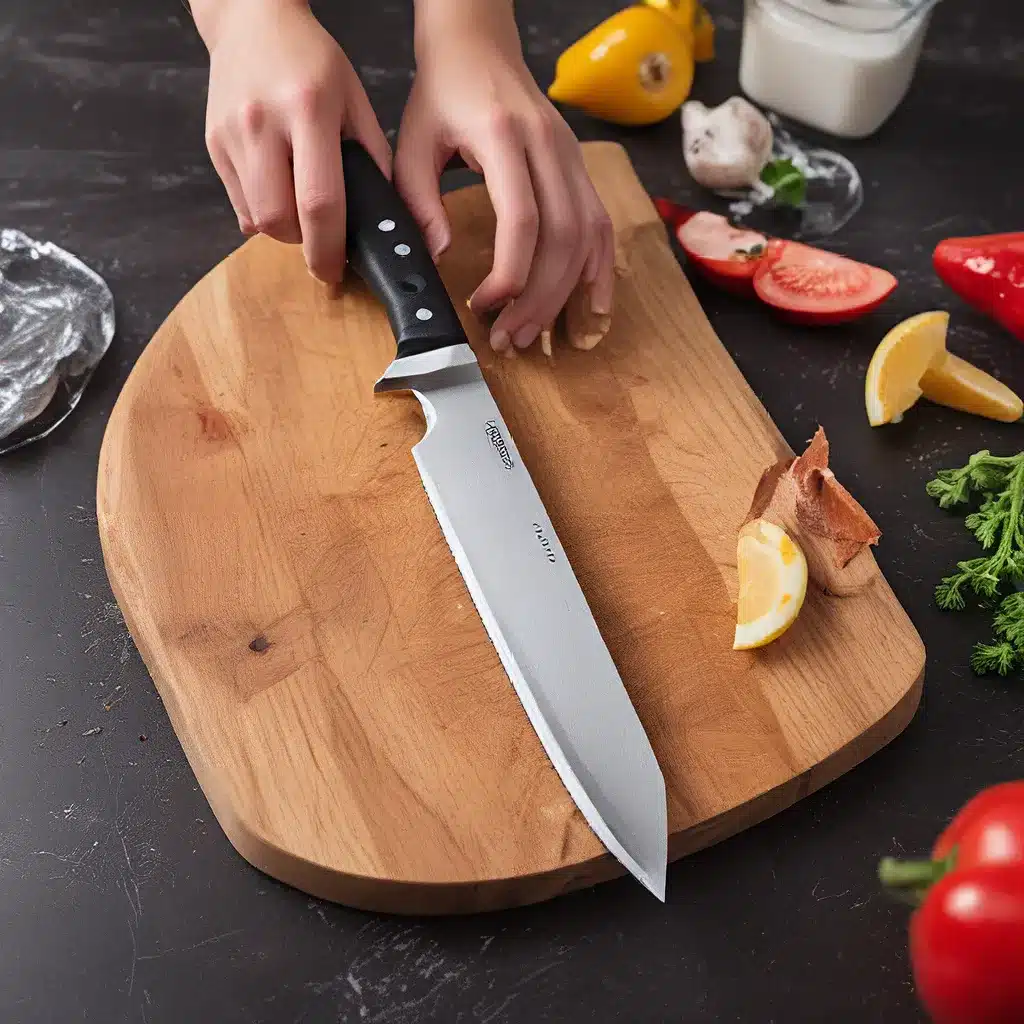
The Unseen Dangers in Your Kitchen
As a passionate home cook, I’ll admit that I used to be a bit lax when it came to properly cleaning and maintaining my knives. I mean, they’re just tools, right? As long as they cut well, that’s all that matters, right? WRONG. The truth is, improper knife hygiene can pose some serious health risks, and it’s not something any of us can afford to ignore.
Did you know that an estimated 1 in 6 Americans will get sick from food poisoning this year alone? That’s a staggering statistic, and a big part of the problem often boils down to poor kitchen practices – including how we care for our knives. You see, those seemingly innocuous blades can actually become breeding grounds for dangerous bacteria like salmonella and E. coli if we don’t keep them clean and well-maintained.
The Perils of Cross-Contamination
One of the biggest dangers is cross-contamination, which happens when bacteria or other harmful substances get transferred from one food to another. For example, if you use the same knife to chop raw meat and then slice a piece of fruit without properly washing it in between, you could be unwittingly transferring nasty bugs from the meat to the fruit. And just like that, you’ve got a recipe for potential food poisoning disaster.
But it’s not just cross-contamination we need to worry about. Even after a thorough cleaning, tiny food particles can still cling to the knife blade, becoming a breeding ground for all sorts of unsavory microbes. These hidden bacteria can then be transferred to whatever you’re cutting next, putting you and your loved ones at risk.
Keeping Your Knives Squeaky Clean
So, what’s the solution? The key is to make knife hygiene a regular part of your kitchen routine. After each use, be sure to give your blades a thorough wash with hot, soapy water. And don’t just rinse them off – really scrub those surfaces to dislodge any stubborn bits of food.
But the cleaning doesn’t stop there. Experts recommend sanitizing your knives at least once a day, using a food-safe sanitizing solution or even a quick dip in boiling water. This extra step helps eliminate any lingering bacteria that could pose a threat.
Proper Storage is Key
Of course, proper storage is also crucial for maintaining knife hygiene. Rather than just tossing them in a drawer or leaving them on the countertop, consider investing in a knife block, magnetic strip, or specialized knife tray. These options not only protect the blades from potential damage, but they also keep the knives out of reach of curious little hands (a must-have if you have kids in the house).
Sharpness Matters Too
But wait, there’s more! Knife hygiene isn’t just about cleaning – it’s also about sharpness. You see, a dull knife is actually more prone to harboring bacteria than a sharp one. That’s because the rough, uneven surface of a dull blade provides more nooks and crannies for food particles and germs to cling to.
To keep your knives in tip-top shape, make sure to sharpen them regularly. How often you need to sharpen will depend on how frequently you use the blade, but as a general rule of thumb, it’s a good idea to give them a quick tune-up at least once a year. And if you really want to go the extra mile, sharpen them each time you give them a thorough cleaning.
Advanced Cleaning Techniques
Now, while the basic cleaning and maintenance steps I’ve outlined so far are essential, there are also some more advanced techniques you can use to ensure your knives are as clean and safe as possible.
For example, did you know that you can use a baking soda and water solution to help remove stubborn stains and discoloration? Simply make a paste, gently scrub it onto the blade, and let it sit for a few minutes before rinsing. This can be especially helpful for getting rid of those pesky rust spots.
Another option is to use a vinegar soak. The acidity in the vinegar helps to break down any remaining food particles or bacteria, leaving your knives sparkling clean. Just be sure to rinse them thoroughly afterwards to remove any lingering vinegar taste.
The Importance of Regular Maintenance
At the end of the day, proper knife hygiene isn’t just about food safety – it’s also about preserving the life and performance of your blades. Well-maintained knives will stay sharper for longer, which means you’ll get cleaner, more precise cuts every time you use them. And let’s be honest, who doesn’t love the feeling of gliding through ingredients with a razor-sharp knife?
So, the next time you reach for your favorite cooking knife, take a moment to think about the crucial role it plays in keeping your family safe and healthy. With a little bit of extra care and attention, you can ensure that your knives are always in top condition, ready to tackle any culinary challenge that comes your way.
And don’t forget, if you’re ever in the market for some high-quality, precision-made knives that are built to last, be sure to check out Herman Knives. Their rugged yet stylish blades are designed with food safety and longevity in mind, making them the perfect addition to any well-equipped kitchen.


